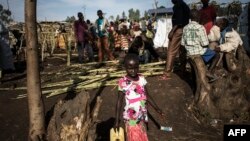"Thousands of children are at risk and have very limited access to basic social services needed for their survival in this crisis," Grant Leaity, UNICEF representative in the DRC, said Saturday after visiting Rutshuru, in Nord-Kivu province.
The situation is likely to persist as people are afraid to return home, said Leaity who recently visited the Rutshuru area where he met with those displaced.
Since March, "more than 190,000 people, half of them children, have been forced to leave their villages in the Rutshuru and Nyiragongo areas," UNICEF said in a statement.
In Kalengera the number of displaced people has more than doubled the existing population.
"Displaced families and host families are in urgent need of food, household items, health and water assistance, hygiene and sanitation," UNICEF said.
"Humanitarian assistance is slow to arrive while needs continue to increase alarmingly," the agency said.
"Due to a lack of assistance, some displaced people are forced to return to their home villages located in unstable" frontline positions, UNICEF warned.
"It is imperative we act now to prevent a significant increase in cases of children suffering from severe acute malnutrition."
Rutshuru has seen a resurgence of violence in recent months with the presence of M23 rebels, who have been fighting DRC's army.
M23, the "March 23 Movement", is a former Tutsi-dominated rebel group that was defeated in 2013.
But it took up arms late last year, attacking government forces and UN peacekeepers, taking control of several areas.
Kinshasa accuses Kigali of supporting the rebels, a charge Rwanda denies.







